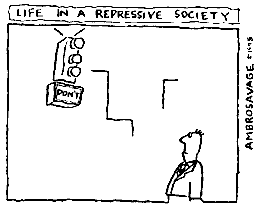go to WASHINGTON FREE PRESS HOME (subscribe, contacts, archives, latest, etc.)
March/April 2000 issue (#44)
|
|
For many people, mental illness is an inscrutable, frightening thing. Our encounters with the mentally ill are brief and unsettling. We meet them on the street, perhaps they are homeless. They say things that do not make sense to us, and we pass them by with a mere uneasy glance. Yet people with mental disorders are often victims, not only of societal fears and ignorance, but also of the very system that is supposed to protect and empower them.
Every system, whether working with developmentally disabled, chronically ill, elderly or children, has its flaws. In addition, social services have never been blessed with an abundance of funds. Yet it is the mental health system that appears to be the most poorly funded, socially neglected system.
Federal and state budget cuts, top-heavy administrations, and outdated standards all adversely affect this beleaguered system. The bulk of the money used to fund the mental health system comes from federal funding, such as Social Security, General Assistance Unemployable, or Supplemental Security Income. That money in turn is allocated to the state and then filters down to the county level.
The county then contracts out to United Behavioral Health, which manages all county-contracted mental health services. These agencies, such as Highline-West Seattle and Community Psychiatric Clinic, provide case management, vocational services, and crisis intervention. These agencies in turn subcontract with smaller agencies that usually provide counseling, recreational and cultural activities, and day treatment. Finally, some of these agencies operate boarding homes which house mentally ill people.
By the time money reaches the smaller agencies and boarding homes, which deal directly with clients, there is hardly any left. These homes are often poorly equipped and terribly understaffed because there is too little money to hire more counselors. Fewer staff members mean fewer people to counsel clients or engage them in recreational or social activities.
At most residences, counselors are paid $8.25 an hour with very few benefits. This leads to a high turnover rate, which can be very difficult for clients. Case management services are also affected by limited funds. Mental health agencies save money with fewer case managers to pay, yet because of this, caseloads tend to be extraordinarily large, sometimes 50 people or more.
Less money means less service for the client, which further increases the risk of hospitalization and homelessness. This is termed "trans-institutionalization", a situation in which mentally ill people spend their lives going from state hospitals to boarding homes, onto the street, to a shelter perhaps and back on the street again.
The clients themselves receive barely any money at all. Most mentally ill people in transitional housing receive Social Security or Supplemental Security, from which monthly payment for room and board is taken. The client is then left with only $34.84 for an entire month. To expect anyone to be able to live off such a small amount of money is ludicrous. What is even more astounding is that the last time this law was altered was over ten years ago when it was raised by five dollars. It is simply political inertia that keeps the only money the client sees at such a miserable level. $34.84 might have been enough to live on in 1965, but is certainly not enough in today's economy.
It would be unfair to say that everyone that works within the mental health system is uncaring or incompetent. There are countless dedicated case managers, nurses, administrators, and counselors, all striving to provide the best of care. Yet the cruel irony is that this resource-scarce system ultimately leads to such a high level of burnout among mental health professionals that the one impetus for remaining in the system, altruism, is quickly depleted.
One of the most important aspects in working with the mentally ill is the energy between the clients and the people who work with them. Yet this is the legacy of mental health, that no matter how diligently one works, it never seems to make a substantial difference. It is so much more difficult to provide any kind of care with limited resources, decreased manpower, and bureaucratic hurdles at every turn.
Easily, one can point to administrative and management problems as the major exhauster of funds. Certainly cuts could be made at each level, thereby creating more money for client services and increased case management and counseling.
But the problems go deeper than just money. The expectations the system places on its clients far outweigh its capacity for providing these services. A shift must occur in the way society perceives mentally ill people and the illnesses they suffer from. When society stops trying to force mentally ill persons into acceptable molds and starts realizing that they have a value all their own, this will signal the beginning of change.

|
go to WASHINGTON FREE PRESS HOME |